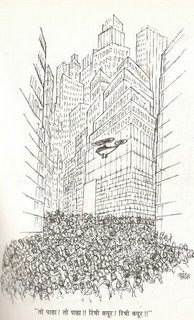When I finished reading
-‘ASHTADARSHANE’ (अष्टदर्शने), 2003, I wrote a letter to
Lalit (ललित) and sent a copy of that to Vinda Karandikar (विंदा करंदीकर).
Lalit published it and Vinda wrote back thanking me for it.
Following is based on that letter of mine.
In Marathi,
M P Rege (मे पु रेगे ) has written a lot on the subject of philosophy using formal prose. It's tough for the writer. And reader!
But writing on philosophy, in any other form is even tougher for the writer.
Particularly, if one wishes to deploy quality humour or poetry. The way
Woody Allen does in
English.
But for the reader, it's easier.
Unfortunately, in Marathi, I have hardly come across such writings.
I remember one example from
P L Deshpande's (पु ल देशपांडे) book.
Pu La imagines that the famous argument between sage
Vasishta and sage
Vishwamitra- 'Who is
Brahmin?' (One: Brahmin knows Brahma, The other: the one who knows Brahma is Brahmin)- took place while both were chewing pans!
Vasant Sarwate (वसंत सरवटे) has drawn a beautiful illustration for it.
It reminded me of
Mel Brooks: "
Nietzsche whispers to you: ‘Without audacity there is no greatness.’
Freud whispers to you: ‘Why must there be greatness?’ That fight’s still going on. And you don’t understand either one, because they’re both whispering in
German."
Frankly other than
Charvak-darshan (चार्वाक), there is little information in Vinda's book that is not there in
Will Durant's 'The story of philosophy' (1926).
However, Vinda's usage of abhang (अभंग) format to write on the subject of philosophy was at the bleeding edge of innovation.
Vinda had good sense of humour as is obvious from many of his poems. Vasant Sarwate too vouches for it.
I hope, some day, his ASHTADARSHANE ushers in Marathi's Woody Allen.
I also suggested that Vinda himself was 20th century's Charvak!
p.s. Read
Vilas Sarang's (विलास सारंग) essay- first published in August 1973- on Vinda's poetry from
'Aksharancha Shram Kela' (अक्षरांचा श्रम केला), 2000. Sarang explains the good and the bad of Vinda's poetry.










